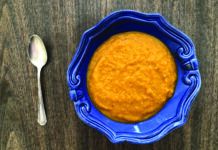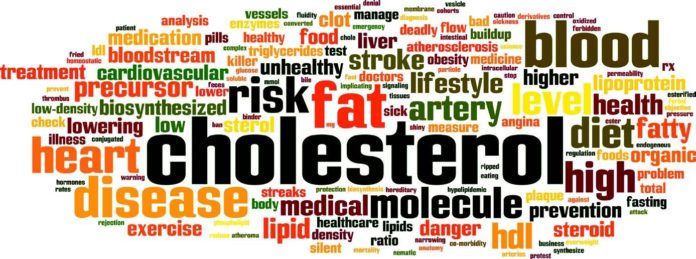We cannot survive without cholesterol in our bodies. It is an essential part of cell walls, is used to make bile acids (which are critical in fat digestion), and is necessary for the production of vitamin D and a number of hormones. But too much LDL cholesterol and not enough HDL cholesterol in the blood is associated with increased risk for heart attack and stroke. While the liver can produce all the cholesterol the human body needs, we also consume it in the form of animal-based foods like meat and dairy.
Question #1: What is cholesterol? Cholesterol is a lipid (fat), and, like other lipids, it does not mix with water. It therefore needs to be ‘packaged’ before it can move around the body in our (largely water-based) blood. These packages, called lipoproteins, vary in density, hence the now-familiar terms low-density lipoprotein (LDL) cholesterol and high-density lipoprotein (HDL) cholesterol. Very low-density lipoprotein (VLDL) may be a less familiar term, but VLDL cholesterol is emerging as an important health measure.
The majority of the cholesterol in blood is LDL cholesterol, often referred to as “bad” cholesterol. Too much circulating LDL cholesterol contributes to the build-up of plaque on the walls of blood vessels, which narrows the vessels over time, raising the risk for heart attack and stroke. In recent years, VLDL cholesterol has also been established to raise the risk for heart attack and stroke.
High-density lipoproteins (HDL)transfer cholesterol from different parts of the body to the liver where it can be used to make other compounds or flushed from the body. HDL cholesterol is therefore referred to as “good” cholesterol. Low HDL cholesterol is linked to higher risk of heart disease
Question #2: What causes high LDL cholesterol? Many factors contribute to LDL cholesterol levels. Heredity plays a role (especially in families with a genetic condition called familial hypercholesterolemia). On average, LDL cholesterol levels tend to rise from youth through middle age, but then are lower again after age 65 when very low LDL levels can be a sign of frailty. While certain medical conditions (like polycystic ovary syndrome) or medications (such as progestins and steroids) van raise LDL, unhealthy lifestyle is the main culprit behind high LDL cholesterol levels. Overweight or obesity, insufficient physical activity, and diets high in saturated fats and low in unsaturated fats all tend to increase LDL cholesterol levels.
Question #3: How does diet impact my blood cholesterol? The food and beverage choices we make can have a big impact on our blood LDL, VLDL, and HDL cholesterol levels, but cholesterol in foods (dietary cholesterol) has only a small influence. “At levels currently consumed in the U.S., dietary cholesterol has minimal effects on blood cholesterol levels,” says Dariush Mozaffarian, MD, DrPH, dean of the Friedman School of Nutrition Science and Policy and editor-in-chief of Tufts Health & Nutrition Letter.
Dietary cholesterol does not greatly impact blood cholesterol levels, but other parts of our diet do. “All the major dietary fats, plus carbohydrates, have major effects,” says Mozaffarian. “Compared with carbohydrate, consuming saturated fats raises LDL cholesterol levels, but also lowers VLDL cholesterol and raises HDL cholesterol, producing an overall neutral effect. Consuming unsaturated fats lowers both LDL and VLDL and raises HDL – an overall positive effect.” Mozaffarian recommends replacing refined carbohydrates or saturated fats with unsaturated fats, especially those rich in phenolics and other beneficial compounds, such as extra virgin olive oil, avocadoes, fish, and nuts/nut butters.
“The latest recommendations are very clear that we should replace saturated fats in our diet with poly- and monounsaturated fats—not refined carbohydrates—to lower LDL cholesterol levels,” says Alice H. Lichtenstein, DSc, director of the Cardiovascular Nutrition Laboratory at the Human Nutrition research Center on Aging and executive editor of Tufts Health & Nutrition Letter. “If, for example, you replace steak and quiche with fish or chicken breast and a salad dressed with soybean or corn oil your blood cholesterol will likely improve.”
Try the following tips for controlling cholesterol levels and improving or maintaining cardiovascular health:Maintain a healthy weight.
-
- -Get (or stay) active.
- -Eat plenty of healthy fats from plant oils like extra-virgin olive, canola, and soybean oils; nuts and their spreads; avocadoes; and fish.
- -Minimize refined carbohydrates like soda, sweets, white bread, white rice, white potatoes, and low-fiber cereals and crackers.
- -Avoid processed meats and eat unprocessed red meats in moderation (no more than two 3-ounce servings per week).
- -Have cholesterol levels checked as recommended.





















I was a competitive runner in my 40’s. In spite of training and running races almost weekly, my total cholesterol was over 300. I had familial hypercholesterolimia. My HDL was over 120 and my LDL was over 100. Eating oatmeal and other whole grains and refraining from red meat and all processed meats and foods (except for garlic and mushroom pizza once a week) nothing changed. Finally, at 45, I started Lipitor 20mg daily.
Since then, my total cholesterol is +/- 200, LDL 100, HDL 118. I am now 79 and very physically active with BMI of 19.5 and the same diet and lipid panel. Wish I could have changed the numbers with diet but it was not possible.
Still on 20mg Lipitor daily. Never had any side effects. Lucky me.
Thank you for information on cholesterol.
Why don’t you include the healthy fats, omega 3, found in salmon and other fish?
The recommendation for chicken instead of beef may be a dated recommendation. Recent work suggets that chicken may have a similar effect on cholesterol as beef. It seems highly limiting meat consumption in general and focusing on more whole, real foods (fruits, vegetables, nuts/seeds, beans, etc.) is the better option instead of the mindset that meat needs/should be a consistent part of one’s daily/weekly diet. I know it’s hard though because meat is so good… 🙂
https://www.nhlbi.nih.gov/news/2019/study-red-and-white-meat-might-have-equal-effects-blood-cholesterol